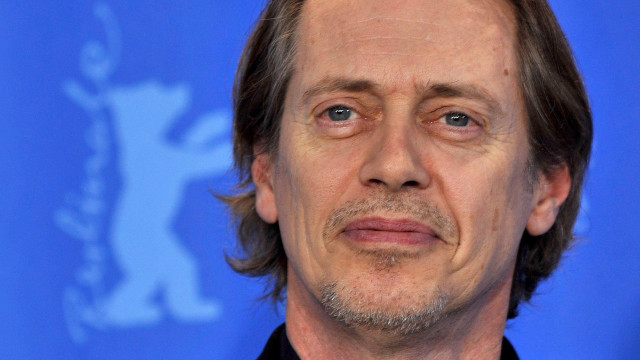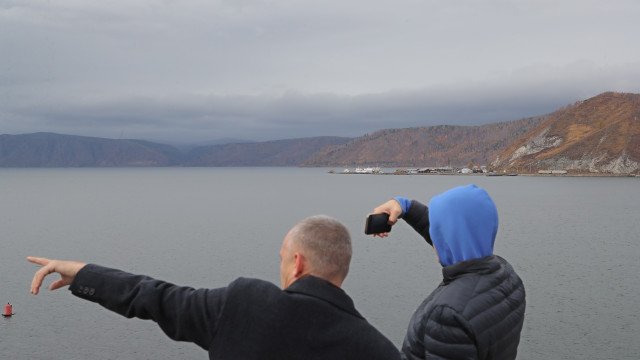In the photo: Iranian President Ebrahim Raisi listens to Russian President Vladimir Putin (unseen) during their meeting at the Kremlin in Moscow, Russia, 07 December 2023. EPA/PAVEL BEDNYAKOV / KREMLIN POOL
A widespread dancing craze to an enthusiastic folk tune where people clap and chant “Oh, oh, oh, oh.”, reports New York Times.
Videos shared on social media, BBC Persian, and Iranians interviewed show men and women of all ages gyrating their hips, twirling their arms, and singing the song's catchy phrases across Iranian cities.
People dance on streets, in stores, in sports stadiums, in schools, malls, restaurants, gyms, celebrations, and everywhere else. Traffic in a key Tehran highway tunnel was stopped for an impromptu dance party to the song. Young ladies with flowing hair dance in parks, and young males do hip-hop choreography.
A group of Tehran guys dance to the popular song fueling the “happiness campaign.”
“It’s obvious that joining this dance trend sends a strong message,” said DJ Sonami, 32, from Tehran. “It protests and demands our freedom and happiness.”
In most nations, public dancing and singing are acceptable. However, public dancing, especially by women and between men and women, is illegal in Iran. While the rule is often broken, its enforcement has been capricious. Iranian culture is based on music, dancing, and singing, and Islamic clerics' 43-year rule has failed to change it.
Only seldom have a song and dance led to civic disobedience. In late November, an old guy in a fish market in Rasht, northern Iran, started it.
The 70-year-old market stall owner Sadegh Bana Motejaded danced and bopped in a white outfit. He sang a traditional song and invited visitors to participate in the fun—helheleh kon, velveleh kon. A small group of men clapped and repeated, “Oh, oh, oh, oh, oh.”
City residents call Mr. Bana Motejaded Booghy, after the Persian word for megaphone. According to footage on his website and local media accounts, he worked at the soccer stadium for years, pacing the bleachers with a megaphone and honking to energize spectators.
“My reason for dancing is to make people happy,” Mr. Bana Motejaded told a local TV reporter last week. “I only want people to be happy and change mood.”
After posting a remix of the song with techno sounds and a local blogger's dance on Instagram, Mr. Aghapour's video of him dancing and singing in the market went viral.
Next came the crackdown. On Dec. 7, Rasht police detained 12 males in the video, shut down their Instagram accounts, and deleted the footage from various websites.
Mr. Bana Motejaded's Instagram page, with 128,000 followers, has a judiciary logo instead of his profile photo. All his posts were gone, and the judiciary posted, “This page has been shut down for creating criminal content” and that the offender “has been dealt with.”
In a Rasht telephone interview, a friend of Mr. Bana Motejaded said the Revolutionary Guards' local intelligence division had summoned the men and interrogated them for hours. He stated they were blindfolded, assaulted, threatened with legal action, and forced to swear off public singing and dancing.
He stated Mr. Bana Motejaded was imprisoned for hours and accused of inciting government opposition. He said police raided Rasht street musicians, detained several, and took their instruments as part of the operation.
In 2022, women led a nationwide uprising in Iran that was crushed by violence, but protests continue in creative ways, such as Ashura religious participants changing religious ballad words to express their disdain for the Islamic Republic or the current dance trend.
Iranian indignation grew quickly after the arrests. Many irate social media users accused the administration of warring with happiness. They stated police quickly arrested people for just celebrating but neglected to apprehend corrupt officials.
“The regime has no common sense,” said 50-year-old Rasht physician Mahan, who requested anonymity. “It has become like an authoritarian father, unable to protect and guide his family and depending on violence to feel powerful.”
People filmed themselves dancing to the song everywhere, imitating Mr. Bana Motejaded. They called it the “happiness campaign” and shared the films on WhatsApp and social media.
Since posting it on Instagram on Dec. 1, Mr. Aghapour's remix, which contains the original dance, has garnered 80 million views.
Local media carried front-page pieces challenging the crackdowns' rationality, claiming they made government rules seem bad. In an X post, eminent sociologist Mohammad Fazeli labeled it a “defeat while maneuvering” and a “self-made disaster.”
The conservative newspaper Farhikhtegan headlined, “How to create an opposition activist out of a simple singer.” Officials and clergy argued the violent response indicated the Islamic Republic was out of touch with public opinion.
“If an old man expresses some happiness outside his shop we think of him as a criminal, but if he had danced during our religious ceremonies, he would be praised,” said tourism minister Ezzatollah Zarghami, a former Guards commander and state television chief. “We have trouble projecting happiness.”
The dance protests were so popular that the Asia Football Confederation's [AFC] official Farsi page with almost 4 million followers shared a video of Iranian soccer stars and teams dancing and applauding to the song.
The government withdrew. On Monday, Gilan police denied arresting Mr. Bana Motejaded. They revived his Instagram with all his dancing and singing pictures. Local TV outlets interviewed him, and in one video he claims he was not arrested, maybe pressured.
His Instagram profile has almost a million followers, and many Iranians see him as a national hero who accidentally ignited a change movement. /BGNES

 during their meeting at the Kremlin in Moscow, Russia, 07 December 2023.jpg)





